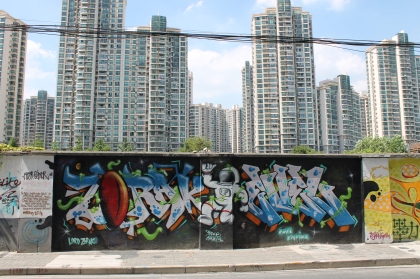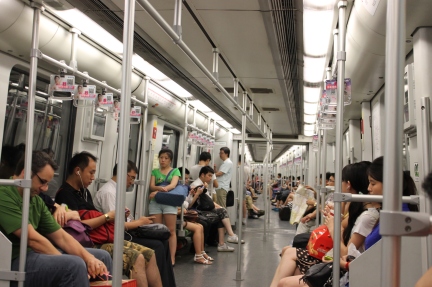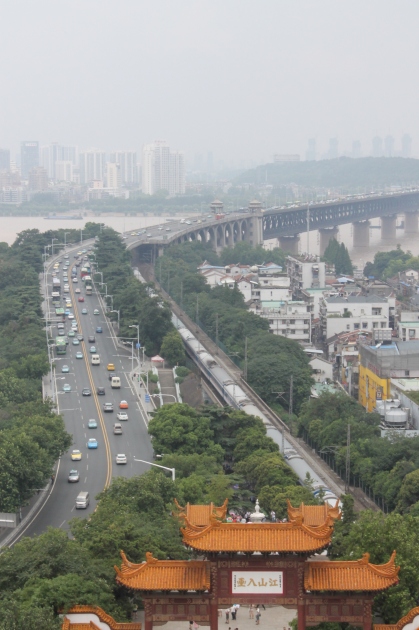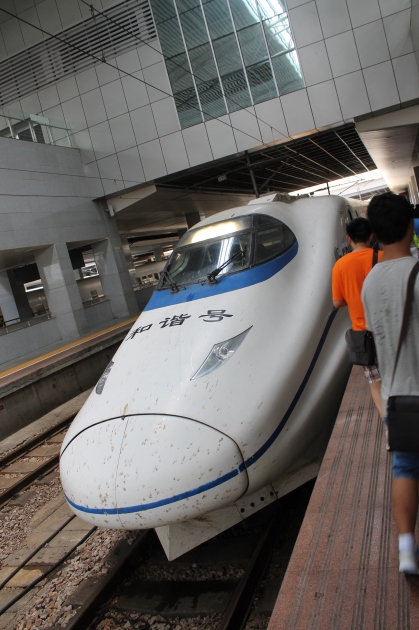 On a relatively modest list of my favorite things in life, seeing fireworks in the sky is nearly at the top. I think of the Fourth of July in my hometown, on a hill by my parents’ house. Sometimes New Year’s Eve, depending on where I am or what I am doing. Exploding lights and colors in the sky awakens a very sentimental and romantic part of my being deep down inside, and, spending this year in the People’s Republic of China, I have had many opportunities to feel this love stir. During the Spring Festival, or Chinese New Year (celebrating the lunar new year in January of February—depending on the movements of, well, la lune—instead of the new year of the Gregorian calendar celebrated in the West), which I came back for the tail-end of after having been in California, Chinese folks certainly like setting off fireworks. And none of that namby-pamby nonsense of concentrated locales and designations for how these bursting sirens are given to the night sky; everywhere I turned, there were fireworks. Anyone in those moments could have been the Gandalf of Chinese New Year, raining down fiery goodness around us. In Beijing, for my return at the end of the holiday, each night up through February 14 featured a demonstration of evening pyrotechnics, with the most bang coming on this final night. (The previous evenings to the final night sounded like some sort of aerial bombardment—I am glad that I am privileged enough to not actually know what this sounds like.)
On a relatively modest list of my favorite things in life, seeing fireworks in the sky is nearly at the top. I think of the Fourth of July in my hometown, on a hill by my parents’ house. Sometimes New Year’s Eve, depending on where I am or what I am doing. Exploding lights and colors in the sky awakens a very sentimental and romantic part of my being deep down inside, and, spending this year in the People’s Republic of China, I have had many opportunities to feel this love stir. During the Spring Festival, or Chinese New Year (celebrating the lunar new year in January of February—depending on the movements of, well, la lune—instead of the new year of the Gregorian calendar celebrated in the West), which I came back for the tail-end of after having been in California, Chinese folks certainly like setting off fireworks. And none of that namby-pamby nonsense of concentrated locales and designations for how these bursting sirens are given to the night sky; everywhere I turned, there were fireworks. Anyone in those moments could have been the Gandalf of Chinese New Year, raining down fiery goodness around us. In Beijing, for my return at the end of the holiday, each night up through February 14 featured a demonstration of evening pyrotechnics, with the most bang coming on this final night. (The previous evenings to the final night sounded like some sort of aerial bombardment—I am glad that I am privileged enough to not actually know what this sounds like.)
From the rooftop of my apartment building in Beijing, each direction in which I could turn contained a show. Electric color shimmering through the milky night—while noxious to breath, the infamous Beijing air pollution rendered this night beautiful. Running down from the roof and out to the surrounding plazas, the roar of the fireworks was absolutely deafening; eventually I retreated back inside due to a soreness in my sweet ear-holes. Some sounds were simply loud explosions, felt in the ear and in my chest. Some fireworks shimmered like thousands of tiny comets pinpricking the night, creating the sound of heavy rain hitting a window. Families were in the streets, setting off smaller fireworks to the jubilation of small kids. Slightly older kids were making little bonfires from the cardboard refuse of these wonders. Having retreated to my apartment, drinking tea in my veranda-kitchen, I attained a moment of pure fixation when a series of fireworks were set off in the street directly below me so that the radiance of light thundered directly at the level of my eleventh floor windows. I was blessed for a moment in what seemed like my very own fireworks show, enjoyed from the comfort of my kitchen table.
While this episode is recent and fresh in my mind, it did not mark the beginning of fireworks magic time in my Chinese sojourn. When I first arrived here, six months ago at this point, I needed to stay in a southern city called Ningbo for a time in order to help out by teaching in one of my company’s English programs. Ningbo is a lovely city, south and around the corner from Shanghai. The high school in which I was teaching is located in a suburban district, slightly off the beaten path. One evening after classes wrapped up, I was told that it was too late to catch the bus back to my apartment, and I would need to take a taxi. I walked out of the school to a forlorn-looking intersection of this suburban night, and not a soul was stirring. In that moment, melancholy set about me; I missed my gentleman-friend and my loved ones at home, and I felt alone with no way to get home. Standing there, waiting for a taxi that did not seem to be coming, I was bummed. Another moment passed, and I had given into the eventuality of starting the somewhat long walk to the apartment, when *WOOSH* *BANG*!!! Above the intersection, from behind a building, a series of fireworks rocketed into the night sky and cast their light upon the whole street like the flares of a shipwrecked soul in the endless sea. The red, green and yellow florescence of light burned away my despair. Moments passed, and fireworks continued shooting into the sky. I stood transfixed, enjoying the surprise and delight of the moment. However, the fireworks ceased after awhile. As the cacophony faded from the night almost as instantly as it had arrived, a taxi drove up. I flagged it down, entered, and got home.










